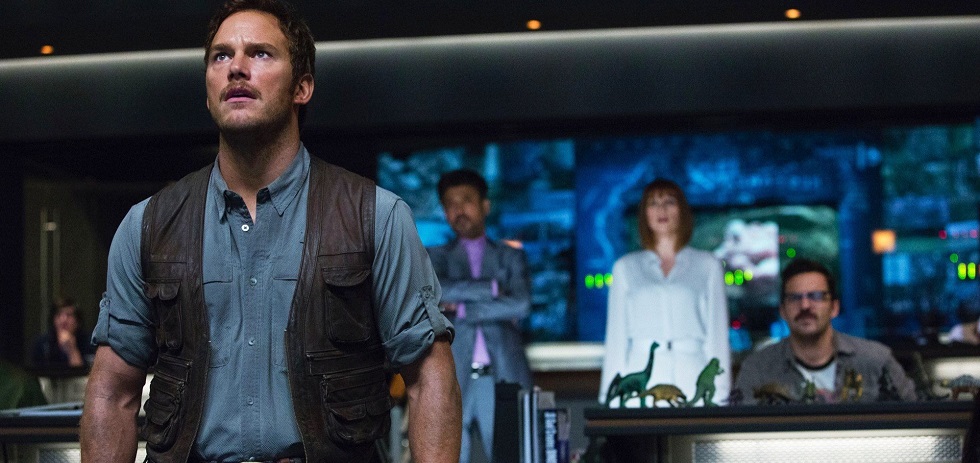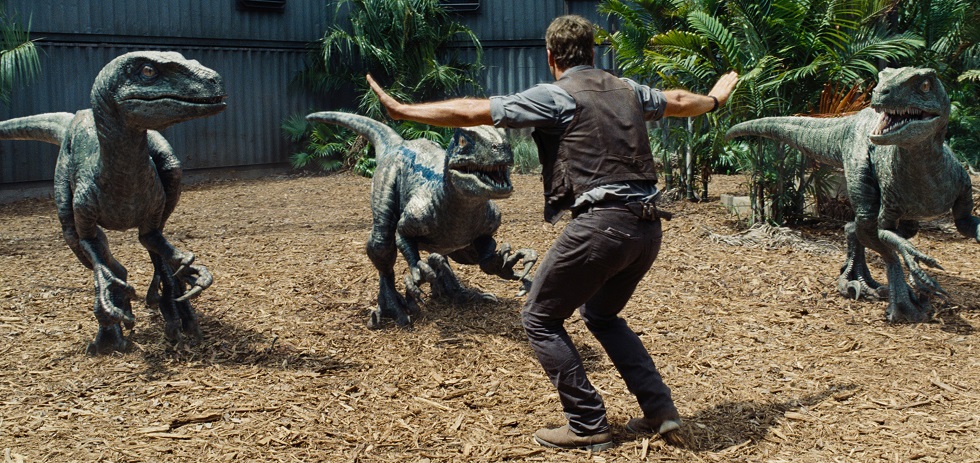After over a decade in development hell, the long-rumored follow-up to 2001’s dire Jurassic Park 3 has arrived. Plunging audiences back into Isla Nublar, InGen (the fictional company behind the original’s Jurassic Park) has expanded their original park concept into a fully fledged Jurassic World (because, somehow, multiple deaths and the infamous events of the first and second films haven’t tarnished their reputation), which promptly falls under attack from a genetically modified creature, the Indominus Rex, a near-unstoppable killing machine. From the box-office records that this film has already smashed alone it is clear that the time was right for another installment into the Jurassic series – unfortunately this isn’t the film fans deserve; it’s a snide, sarcastic, and overall nasty addition to the Jurassic series that loses a lot of what made the original series (or, at least the first two)1 so special.
Our journey is filtered through two brothers, Zach (Nick Robinson) and Gray Mitchell (Ty Simpkins), who are sent to Jurassic World for the holidays by their parents (the super underutilized Judy Greer and Andy Buckley) so that they can spend time with their aunt and operations manager, Claire Dearing (Bryce Dallas Howard) – a character that embodies an even more lackluster representation of women than most of the female characters in this year’s Entourage. Claire is another audience anchor as she teams up with the fairly cardboard and uncharismatic Owen Grady (Chris Pratt) – a rogue, ethical trainer and researcher – to save the boys later in the film. Before this, we have to endure stacks of dull exposition: we find out the kids parents are on the verge of divorce, Zach’s going to the troubles of puberty, Owen is the park’s only competent worker, Claire is too busy to care about her nephews, people are bored with seeing dinosaurs(!), Claire and Owen once had a ‘thing’. All of this is intercut with an array of CGI rendered dinosaurs that look less realistic than their animatronic counterparts from the original 1993 outing (although they are obviously a marked improvement on that film’s use of CGI), and fail to effectively communicate mass and space.
After all of this introductory exposition (it seriously goes on for 40 minutes, not what you want in your film about dinosaurs), we are introduced to the Indominus Rex, a genetically modified dino-organism-mash-up of a whole bunch of “scary” animal traits. The hybrid-dinosaur, supposedly the ultimate apex predator – something the park would definitely wish to manufacture and keep in fairly insecure captivity – escapes from its enclosure and runs wild, destroying all creatures in its wake. After locating the tracking device embedded in its body and clawing it out (you know you’re in trouble when your script takes cues from Richard Stanley/John Frankenheimer’s infamous Island of Dr. Moreau adaptation),2 the dinosaur becomes untraceable to park security and it’s on for young and old. Because dino-rampage is apparently less interesting than a plotline about two brothers learning to love each other, Zach and Grey have gone off-road in a futuristic, spherical all-terrain vehicle, finding themselves in the destruction path of the monster. Unable to locate them, Claire tasks Owen in assisting her, else she forever bear the wrath of her nephews dying in a freak accident that is totally beyond her control. While it’s an alright premise for a sequel/reboot overall,3 that could have been great if handled better, its execution is lacking here, with too many contrived moments in its former half (which establishes the conceit), and a lack of overall cohesion in its later moments as we jump from action set-piece to set-piece. As we near the end of the film, the whole thing begins to feel more and more like a big-budget Birdemic.
This film has seen praise from some for its apparent anti-capitalist, anti-profiteering meta-satire of everything that’s wrong with the film industry – reboots, product placement, movie tie-ins etc. – a sort of snarky ‘clever’ dig at the film itself. Sure, there’s some of that here, but it’s of pretty poor quality and completely overshadowed by the barrage of actual product-placement, franchise derailment, and the cynical, contrived formal Hollywood tropes littered throughout this very corporate product. Within 10 minutes I’d spotted some pretty overt in film advertising for Hilton Hotels, Beats By Dre, and Coca-Cola. What is the point of satire if you buy into what you’re critiquing?4 As a side-note, for a post-Blackfish film that deals with raising living beings in captivity, this is a terrible Blackfish film – I cared about none of the dinosaurs, nor was any criticism leveled at the notion of zoos or animal parks beyond a few throwaway lines from Owen about creatures that aren’t used to a world outside their enclosure and the way in which they interact with other entities, despite clear visual ties to Sea World and occasional nods towards the negative capital-over-ethics nature of such businesses.
While I do appreciate the efforts to present us with a sequel rather than a reboot, Jurassic World isn’t a very good one, a tonal departure from its predecessors that cynically trashes its past and embodies all the worst traits of films that ride on the success its decades-old predecessors. Perhaps worst of all, Jurassic World is not a kids film – the violence and dino-attacks are shot with such aggression, with the blood of mashed and mangled corpses often splattered across the screen; gone are scenes of Seinfeld‘s Newman on the toilet, or exhilarating sequences of running away from dinosaurs, replaced with scenes of pure terror. It doesn’t help that the film’s main anthropomorphic villain shares more traits with a predator from the Predator series than it does with any actual dinosaur. Gone is the wonder of the first film, and the ridiculous, over-the-top fun of The Lost World, everything replaced with a cynical, dark tone that doesn’t meld with the franchise or the expectations it sets (this is coming from someone who enjoyed, but is not nostalgic for, its predecessors).
On top of this, the film (like the recent Poltergeist remake before it) seems to hold disdain for its earlier instalments, trashing them at every opportunity, occasionally even destroying props from the 1993 franchise-starter, despite completely paling in comparison to them in nearly every respect (except gore, and no one was asking for that in a Jurassic film). An early scene sees a researcher at the facility note that traditional dinosaurs are “boring” now and that they aren’t enough to keep an audience entertained, which rings fairly hollow as this film relies on them exclusively to retain audience attention for the majority of its runtime; the genetically modified hybrid-dino isn’t even introduced in the film’s first third, and the final act relies on the introduction of a Tyrannosaurus Rex going against everything this early sequence of meta-dialogue suggests. Many other lines also border on calling the original “lame”, which is particularly rich as I can’t think of anything more lame than unknowingly embodying all of the trends that you are satirising because you are a corporate mess of a film. If this is what giving the writer/director of Safety Not Guaranteed a big budget and free rein with a Hollywood franchise means, I want out – Safety Not Guaranteed was a solid, understated little indie-romance flick and was a heap of quaint, ‘hipster’-tinged fun; this is a lazy, cynical, ‘hip’ mess.
Sydney Taylor over at Letterboxd has astutely pointed out that “this movie wants you to think it’s Chris Pratt, but it’s Vincent D’Onofrio”, the human villain of the piece – a “mean, gnarly, and cynical [character] with a contempt for the human race”. I couldn’t agree more; between this and Gareth Edwards’s underwhelming Godzilla reboot, James Gunn’s dreadfully overhyped (but admittedly aesthetically pleasing) Guardians of the Galaxy, and Marc Webb’s atrocious The Amazing Spider-Man reboots, we’re seeing all of these interesting, independent, creative minds attaching themselves to huge projects only to deliver extremely underwhelming content, perhaps indicative of a production system that wants fresh voices but doesn’t want to hand control to them, pumping out mangled, half-baked concepts that never fully reach their potential as a result.
While there are a number of issues with its tone and pacing, it can’t be faulted in terms of its structural cohesion and consistency – while many sequences may be littered with contrived dialogue and circumstances, scenes run together logically, stakes are raised proficiently (although the final Tyrannosaurus Rex reveal is a complete anti-climax), it looks good, and the whole thing ‘works’, even though the result is poor. At the end of the day, though, despite the obvious musical cues and set dressing, this just doesn’t feel like a Jurassic film, nor does it feel like a clever subversion of one; it’s still watchable and not cringe-inducingly dumb, however it’s just not a good time on the whole, nor is it remotely worthy of the (admittedly middling) reception it has seen, nor its box office. Audiences are not getting their money’s worth with this film, and nobody can convince me otherwise.
Around the Staff
| Luke Goodsell |


